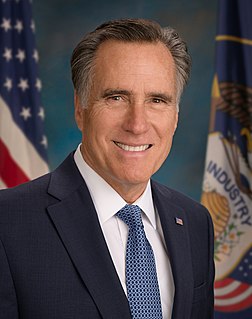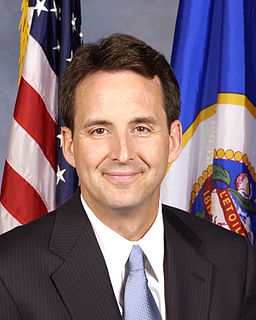The following is a timeline of major events leading up to and immediately following the United States presidential election of 2008. The election was the 56th quadrennial United States presidential election. It was held on November 4, 2008, but its significant events and background date back to about 2002. The Democratic Party nominee, Senator Barack Obama of Illinois, defeated the Republican Party's nominee, Senator John McCain of Arizona.

The Iowa Straw Poll was a presidential straw poll and fundraising event for the Republican Party of Iowa. It was held six times, traditionally in late summer approximately six months in advance of contested presidential Iowa caucuses, from 1979 until 2011, on the campus of Iowa State University in Ames.

The Nevada Republican caucuses, 2008 was held on January 19, the same day as the 2008 South Carolina Republican primary, with 31 delegates at stake. Mitt Romney was the winner in Nevada with 51% of the votes, with Ron Paul in second place. Half of Romney's votes came from Mormons, while two-thirds of the independent voters favored Paul. According to the Las Vegas Sun, Republicans crossed over in large numbers to vote Democratic; CNN exit polls indicated that Republican voters made up 4% of the Democratic caucus turnout.

The 2012 United States presidential election was the 57th quadrennial American presidential election, held on Tuesday, November 6, 2012. The Democratic nominee, President Barack Obama, and his running mate, Vice President Joe Biden, were elected to a second term. They defeated the Republican ticket of businessman and former Governor Mitt Romney of Massachusetts and Representative Paul Ryan of Wisconsin.
The following is a timeline of major events leading up to the United States presidential election of 2012. The election was the 57th quadrennial United States presidential election and was held on November 6, 2012.

The 2012 Republican presidential primaries were the selection processes in which voters of the Republican Party elected state delegations to the Republican National Convention. The national convention then selected its nominee to run for President of the United States in the 2012 presidential election. There were 2,286 delegates chosen, and a candidate needed to accumulate 1,144 delegate votes at the convention to win the nomination. The caucuses allocated delegates to the respective state delegations to the national convention, but the actual election of the delegates were, many times, at a later date. Delegates were elected in different ways that vary from state to state. They could be elected at local conventions, selected from slates submitted by the candidates, selected at committee meetings, or elected directly at the caucuses and primaries.

This article contains opinion polling by U.S. state for the 2012 Republican Party presidential primaries.
The 2012 United States Republican Party presidential debates were a series of political debates held prior to and during the 2012 Republican primaries, among candidates for the Republican presidential nomination in the national election of 2012. The first debate occurred on May 5, 2011, in Greenville, South Carolina, and was hosted by Fox News, while the last debate was held February 22, 2012, in Mesa, Arizona, and was hosted by CNN.

The 2012 United States presidential election in Iowa took place on November 6, 2012, as part of the 2012 general election in which all 50 states plus The District of Columbia participated. Iowa voters chose six electors to represent them in the Electoral College via a popular vote pitting incumbent Democratic President Barack Obama and his running mate, Vice President Joe Biden, against Republican challenger and former Massachusetts Governor Mitt Romney and his running mate, Congressman Paul Ryan.

This is a list of straw polls that have been conducted relating to the Republican presidential primaries, 2012.

The 2012 presidential campaign of Ron Paul, U.S. Representative of Texas, began officially in 2011 when Paul announced his candidacy for the 2012 Republican Party nomination for the U.S. Presidency.

Former Senator Rick Santorum of Pennsylvania began a campaign for the 2012 Republican Party nomination for president of the United States in April 2011. He had been preparing for a run since shortly after the 2008 presidential election.

The 2012 United States presidential election in New Hampshire took place on November 6, 2012, as part of the 2012 United States presidential election in which all 50 states plus The District of Columbia participated. New Hampshire voters chose four electors to represent them in the Electoral College via a popular vote pitting incumbent Democratic President Barack Obama and his running mate, Vice President Joe Biden, against Republican challenger and former Massachusetts Governor Mitt Romney and his running mate, Congressman Paul Ryan.
The start of the 2012 Republican race for president was shaped by the 13 presidential debates of 2011 beginning on May 5. Gary Johnson and Buddy Roemer, both former Governors, were left out of most of the debates, leading to complaints of bias. On December 28, 2011 Johnson withdrew to seek the Libertarian Party nomination and on February 23, 2012 Roemer withdrew to seek the Reform Party and the Americans Elect nomination.

This article contains opinion polling by U.S. state for the 2012 Republican Party presidential primaries.

This article contains opinion polling by U.S. state for the 2012 Republican Party presidential primaries.

This article contains opinion polling by U.S. state for the 2012 Republican Party presidential primaries.

This article contains opinion polling by U.S. state for the 2012 Republican Party presidential primaries.

This article contains opinion polling by U.S. state for the 2012 Republican Party presidential primaries.

This article contains opinion polling by U.S. state for the 2012 Republican Party presidential primaries.












